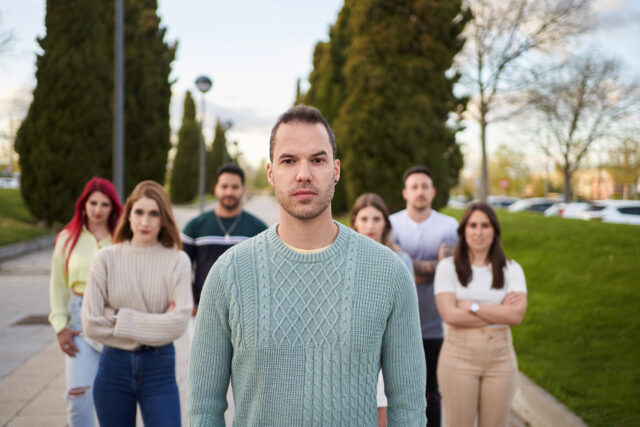Some people relish their alone time, while others dread it and do everything they can to avoid solitude.

If you feel like you need to constantly be surrounded by other people in order to feel happy and secure, it might be more than just a preference for company — it can say a lot about how you feel about yourself, your relationships, and the world around you. While it doesn’t necessarily mean there’s anything wrong with you, it’s possible you have some work to do on your self-worth and self-love. Here are a few reasons you might struggle to enjoy your own company.
1. You rely on other people to validate you.

If you constantly need someone around, you may be seeking external validation. Being alone means you don’t have immediate feedback from other people, and that can feel unsettling. You might be looking for reassurance that you’re doing okay or that you’re valued, and being alone leaves you questioning your worth.
2. You struggle with self-reflection.

Alone time often means confronting your thoughts and feelings without distraction. If you avoid solitude, it might be because you find self-reflection uncomfortable or overwhelming. Facing your inner world can be tough if there are unresolved issues you’d rather not think about.
3. You feel more secure with distractions.

When you’re constantly surrounded by noise, people, or activity, it can serve as a distraction from deeper worries or insecurities. Being alone can strip away those distractions, making you feel vulnerable. You may be using busyness to avoid feelings of anxiety or uncertainty.
4. You have a fear of missing out (FOMO).

The thought of being alone might trigger a fear that life is happening without you. You worry about missing out on fun, opportunities, or important moments. That fear can drive you to stay connected with people constantly, even if you’re exhausted or need a break.
5. You tie your identity to your social connections.

If your sense of self is closely linked to your relationships, being alone can feel like losing a part of who you are. Your identity might revolve around being someone’s friend, partner, or colleague, and solitude leaves you wondering who you are without those roles.
6. You feel anxious without social interaction.

Social interaction might be a comfort blanket for you. When you’re alone, feelings of anxiety or restlessness can bubble up. The presence of other people helps you feel grounded, and solitude makes you uneasy because it takes away that sense of security.
7. You’re a natural extrovert.

If you draw energy from being around people, solitude can feel draining rather than refreshing. Extroverts thrive on social interaction, and too much alone time can leave you feeling bored, flat, or even isolated. Being around other people keeps you feeling lively and connected.
8. You may fear facing unresolved emotions.

Sometimes, being alone forces you to confront tough feelings you’d rather ignore. Unprocessed feelings like grief, anger, or sadness can rise to the surface in solitude. Avoiding alone time might be a way to avoid dealing with these emotions directly.
9. You worry about being forgotten.

The idea of being alone might stir up fears of being left out or forgotten. You may associate solitude with loneliness or irrelevance, making it hard to enjoy your own company. Staying connected with people helps you feel visible and important.
10. You haven’t learned to enjoy your own company.

If you’re not used to spending time alone, it can feel awkward or boring. Developing hobbies, interests, or routines that you enjoy solo can help. Sometimes, it’s just about getting comfortable with the idea that your own company is enough.
11. You thrive on external energy.

You may feel most alive when you’re around other people, feeding off their energy, humour, or ideas. Being alone means that external energy is gone, leaving you feeling flat or uninspired. You might find it hard to generate motivation or excitement on your own.
12. You associate solitude with rejection.

If you’ve experienced rejection or exclusion, being alone can trigger memories of those feelings. Solitude might feel like you’re being rejected all over again, even if it’s by choice. The association can make you avoid being alone to protect yourself emotionally.
13. You’re afraid of boredom.

For some, the thought of having nothing to do is terrifying. If you constantly need stimulation or activity, solitude might seem dull or pointless. You might fear that boredom will lead to negative thoughts or feelings you don’t want to face.
14. You feel more confident with other people around.

Being in a group can make you feel more confident, supported, or validated. Alone, you might doubt yourself or feel uncertain. The presence of your fellow humans boosts your confidence and helps you feel more secure in your decisions or actions.
15. You crave connection and belonging.

At your core, you might have a strong need for connection and a sense of belonging. Humans are social creatures, and for you, being alone can feel like being disconnected from the world. You want to be around people to feel part of something bigger than yourself.




